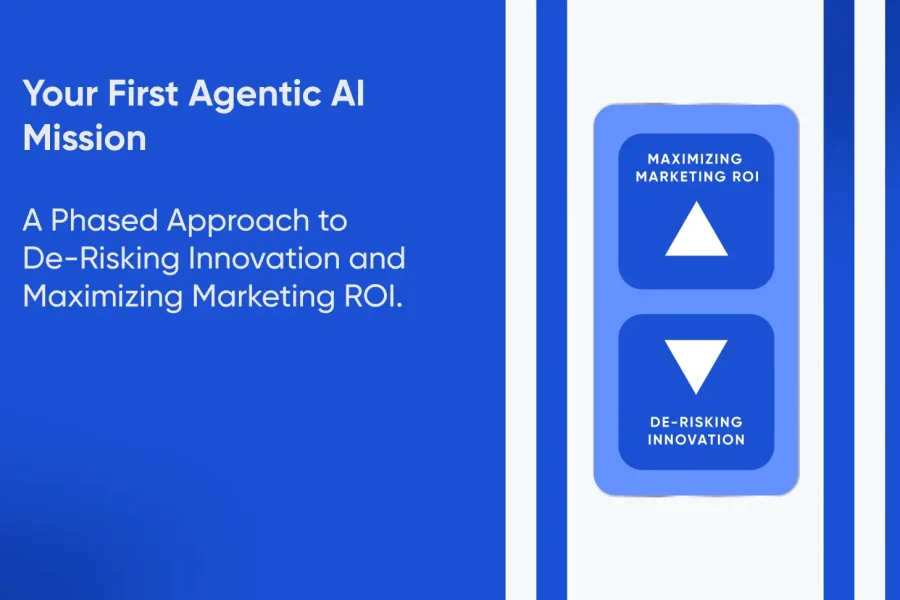Executive Summary
The Challenge: Moving from Agentic AI strategy to successful implementation requires a structured, risk-conscious approach that delivers measurable business results
The Solution: A proven six-phase mission framework that de-risks innovation while accelerating time-to-value for large enterprises
The Strategic Value: Systematic approach that transforms marketing operations while building enterprise-wide AI capabilities for sustained competitive advantage
Your Next Step: Begin with Discovery & Alignment to establish the foundation for scalable, high-ROI Agentic AI implementation
Throughout our series, we’ve taken you from problem identification to solution understanding. We’ve shown you how to find your sweet spot. We’ve introduced our 4A Framework for systematic implementation.
Now comes the moment of truth: How do you actually launch your first Agentic AI mission with confidence?
Here’s what we’ve learned from enterprise AI implementations: success comes not from having the best technology, but from having the most disciplined approach to deployment.
According to McKinsey’s 2024 State of AI Report, organizations that follow structured implementation methodologies are 2.3x more likely to achieve their AI objectives within the first year.
Your first Agentic AI mission isn’t just about solving an immediate marketing challenge. It’s about establishing the foundation for enterprise-wide transformation while proving measurable ROI that justifies broader investment.
Today, we’re providing your complete phase wise mission roadmap that bridge Tatvic’s 4A Framework with practical implementation steps that minimize risk and maximize business impact.
Why Your First Mission is Make-or-Break!
Your initial Agentic AI implementation sets the tone for your entire enterprise AI strategy.
Gartner’s 2024 AI Strategy Survey found that organizations with successful first AI projects are 4.2x more likely to achieve enterprise-wide AI adoption within three years.
The stakes are significant:
- Success creates organizational momentum and secures future AI investments
- Failure can delay enterprise AI adoption by 12-18 months and create lasting resistance
- The approach you establish becomes the template for all future AI initiatives
This is why a structured, proven approach isn’t just recommended—it’s essential.
The Six-Phase Mission Framework
Our mission framework systematically implements Tatvic’s 4A methodology through six concrete phases that large enterprises can execute with confidence.
Phase 1: Discovery & Alignment (Assess Foundation)
Strategic Objective:
Establish clear business objectives and organizational alignment before any technology deployment.
Duration:
2-3 weeks
Identify Marketing Goals & Data Landscape
Begin by understanding your current marketing ecosystem and defining what success means for your organization.
Key Executive Activities:
- Charter a cross-functional team with representatives from marketing, IT, data, and compliance
- Define specific, measurable business objectives
- Inventory existing data sources and quality
- Assess current team capabilities and identify skill development needs
Align on Success Metrics
Critical Success Metrics:
- Efficiency Gains
- Performance Improvements
- Resource Optimization
- Strategic Impact
According to Deloitte’s AI Implementation Benchmark, projects with clearly defined success metrics are 3.1x more likely to deliver expected ROI within the first six months.
Phase 2: MVP/Pilot Scoping (Architect Strategy)
Strategic Objective:
Select the optimal starting point and define precise scope for maximum impact with minimal risk.
Duration:
1-2 weeks
Choose High-Impact Channel or Product Line
Selection Criteria:
- Explicit Inputs → Process → Outputs
- Reliable, Abundant Data
- High-Volume/Repetitive Tasks
- Speed-Sensitive Processes
Define Pilot Scope & KPIs
Scope Definition Framework:
- Geographic Focus
- Channel Limitation
- Timeline Boundaries
- Budget Parameters
Forrester’s Technology Implementation Research shows that focused pilots with limited scope achieve 67% higher success rates than broad, multi-channel approaches.
Phase 3: Pilot Implementation (Activate Technology)
Strategic Objective:
Deploy Agentic AI solutions within defined scope while maintaining full human oversight and control.
Duration:
4-6 weeks
Develop Agentic AI for Your Ecosystem
Implementation Priorities:
- System Integration
- Human-AI Handoffs
- Safety Mechanisms
- Performance Monitoring
Establish Governance Framework
Governance Elements:
- Approval Workflows
- Compliance Monitoring
- Risk Management
- Documentation Standards
MIT’s AI Governance Research indicates that organizations with comprehensive governance frameworks experience 45% fewer implementation challenges.
Phase 4: Pilot Validation (Activate Performance)
Strategic Objective:
Launch AI-supported operations and gather comprehensive performance data to validate business impact.
Duration:
60-90 days
Launch AI-Supported Campaign
Launch Protocol:
- Gradual Rollout
- Continuous Monitoring
- Team Training
- Stakeholder Communication
Gather Performance Data & User Feedback
Data Collection Framework:
- Quantitative Metrics
- Qualitative Feedback
- Technical Performance
- Business Impact
Stanford’s Human-AI Collaboration Research found that organizations collecting both quantitative and qualitative feedback during pilots achieve 31% better long-term adoption rates.
Phase 5: Pilot Review & Scale Up (Amplify Success)
Strategic Objective:
Evaluate results, refine approach, and plan strategic expansion to additional channels and product lines.
Duration:
2-3 weeks
Evaluate Results & Refine Approach
Evaluation Framework:
- ROI Analysis
- Operational Impact
- Strategic Value
- Lessons Learned
Expand to More Channels & Product Lines
Expansion Strategy:
- Prioritization Matrix
- Resource Planning
- Capability Building
- Risk Management
Boston Consulting Group’s AI Scaling Research shows that organizations with systematic expansion strategies achieve 2.8x greater business impact from their AI investments.
Phase 6: Ongoing Governance & Support (Amplify Capability)
Strategic Objective:
Establish sustainable operations with continuous optimization and enterprise-wide capability building.
Duration:
Ongoing
Maintain Human Oversight & Compliance
Ongoing Governance:
- Regular Performance Reviews
- Compliance Audits
- Continuous Training
- Innovation Pipeline
Continuous Optimization
Optimization Framework:
- Performance Analytics
- Feedback Integration
- Technology Updates
- Best Practice Development
De-Risking Your Innovation Investment
Technical Risk Mitigation
- Gradual autonomy increase
- Human override capabilities
- Comprehensive testing
Business Risk Mitigation
- Limited scope pilots
- Clear success metrics
- Stakeholder alignment
Operational Risk Mitigation
- Change management protocols
- Training programs
- Documentation standards
Accenture’s AI ROI Analysis indicates that organizations following structured implementation approaches achieve positive ROI an average of 35% faster than those with ad-hoc approaches.
Expected ROI Timeline and Milestones
Month 1-2: Foundation establishment
Month 3-4: AI deployment with performance indicators
Month 5-6: Business impact with 15-25% efficiency gains
Month 7-8: Strategic expansion
Month 9+: Enterprise-wide optimization and ROI
Your Mission Begins Now
Your Next Steps:
- Assemble Your Mission Team
- Begin Discovery & Alignment
- Select Your Pilot Opportunity
- Partner with Proven Expertise
Ready to Launch Your Agentic AI Mission?
Contact Tatvic for a confidential strategy session where we’ll help you:
- Assess Agentic AI opportunities
- Design a customized mission plan
- Define timelines and success metrics
- Create a roadmap for enterprise AI
The mission framework provides the path. The 4A methodology provides the discipline.
The decision to begin is yours.


